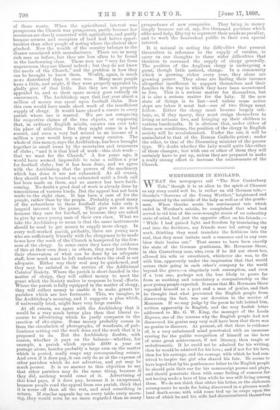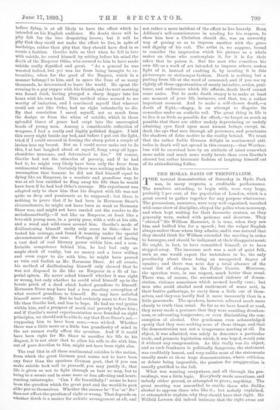WERTHERISM IN ENGLAND.
WHIT the newspapers call " The New Canterbury Tale," though it is as alien to the spirit of Chaucer as any story could well be, is rather an old German tale,— Goethe's "Sorrows of the Young Werther," heightened and complicated by the suicide of the lady as well as of the gentle- man. When Goethe wrote his sentimental tale which ended in Werther's suicide, he complained that what had served to rid him of the over-wrought strain of an unhealthy state of mind, had just the opposite effect on his friends :- " While I had gained light and freedom by translating the real into the fictitious, my friends were led astray by my work, thinking they must translate the fictitious into the real, that they must imitate such a romance and in any case blow their brains out." That seems to have been exactly the state of the German gentleman, Mr. Hermann Steer, in this Canterbury case, who, even if he did not shoot her, allowed his wife or sweetheart, whichever she was, to die with him, apparently under the impression that that would secure their going in each other's company to the world beyond the grave,—a singularly rash assumption, and even if a true one, perhaps not the less likely to prove far from so soothing and consolatory a companionship as the poor young people expected. It seems that Mr. Hermann Stoer regarded himself as a poet and a man of genius, and that he thought that what prevented the English people from discovering the fact, was our devotion to the service of Mammon. If we may judge by the poem he left behind him, written apparently in English, and the very foolish letter addressed to Mr. G. W. Ring, the manager of the Leeds Express, one of the reasons why the English people had not discovered his genius may very well have been that there was no genius to discover. At present, all that there is evidence of, is a very unbalanced mind penetrated with an immense craving for the public recognition of himself as the hero of soiree great achievement, if not literary, then tragic or melodramatic. If he could not be admired for his writing, then he would be admired for his love ; and if not for his love, then for his courage, and the courage with which he had con- trived to inspire the girl who shared his fate. He seems to have hoped that by his posthumous letter to the English people he should gain their ear for his manuscript poems and plays, and should penetrate them with some feeling of remorse for not having made a hero of him while be was still living among them. We do not think that either his letter, or the elaborate arrangement he made for being discovered in a piteous wood- land death-scene, with wild roses tied up in crape upon the hats of which he and his wife bad disencumbered themselves before dying, is at all likely to have the effect which he intended on his English audience. No doubt there will be pity felt for the two despairing lovers ; but it will be pity that they could not make the effort to live, in spite of hardships, rather than pity that they should have died in so scenic a fashion. Goethe tells us that when he fell in love with suicide, he cured himself by setting before his mind the death of the Emperor Otho, who seemed to him to have made suicide really dignified and great. "As a general he was worsted indeed, but yet was far from being brought to ex- tremities, when for the good of the Empire, which in a manner belonged to him, and to spare the lives of so many thousands, he determined to leave the world. He spent the evening in a gay supper with his friends, and the next morning was found dead, having plunged a sharp dagger into his heart with his own hand. This method alone seemed to me worthy of imitation, and I convinced myself that whoever could not act like Otho, had no right voluntarily to die. By that conviction I saved myself, not so much from the design as from the whim of suicide, which in those splendid times of peace had crept into the unoccupied heads of young men. Among a considerable collection of weapons, I had a costly and highly polished dagger. I laid this every night beside my bed, and before I put out the light, tried if I could succeed in forcing the sharp point a couple of inches into my breast. But as I could never make out to do this, I at last laughed aloud at myself, flung away all hypo- chondriac nonsense, and determined to live." Of course, Goethe bad not the stimulus of poverty, and if he had had it, he might very likely have been only the freer from sentimental whims. Certainly there was nothing noble in hie assumption that because he did not find himself equal to dying like an Emperor, in a resolute and grandiose way, he was at all less entitled to fling away his life than he would have been if he had had Otho's courage. His experiment was adapted only to show him that his disgust with life was not quite as deep and passionate as be supposed ; but there is nothing to prove that if he had been in Hermann Stoer's circumstances, he might not have been as weak as Hermann Stoer was, and might not have carried out the resolve to die melodramatically,—if not like an Emperor, at least like a love-sick young man, in a pretty pose, with a wife at his side, and a wood and wild-roses around him. Goethe's mode of disillusioning himself really only came to this,—that he tested his courage, and found it wanting under the special circumstances of the case. Perhaps, if instead of having a vast deal of real literary power within him, and a com- fortable competence behind him, he had had only an ample stock of vanity, but no money and a lover willing and even eager to die with him, he might have proved as vain and foolish as Mr. Hermann Stoer. At all events, his method of disillusioning himself only showed that be was not disposed to die like an Emperor in a fit of im- perial spleen. He never asked himself whether it was right or wrong, but only whether he could wind himself up to the heroic pitch of a deed which looked grandiose to himself. Hermann Stoer may have had a less exacting conception of what seemed grandiose to himself. He may have satisfied himself more easily. But he had certainly more to fear from life than Goethe had, and less to hope. He had no real genius within him, and a prospect of much real poverty before him ; and if Goethe's moral experimentation were founded on right principles, we should not be able to say that Herr Stoer's act,— supposing him to have been sane,—was wicked. Whether there was a little more or a little less grandiosity of mind in the act cannot really affect the question. And if it could have been right for Mr. Stoer to sacrifice his life to his disgust, it is not clear that to allow his wife to die with him, out of pure devotion to him, might not have been right also.
The real blot in all these sentimental suicides is the notion, from which the great German poet seems not to have been any freer than the spurious German poet, that if you can make suicide look well to yourself, you may justify it ; that life is given us not to fight through as best we may, but to bring to a scenic end in some more or less affecting and heart- rending catastrophe. ' Can I die beautifully P' seems to have been the question which the great poet and the would-be poet alike put to themselves. Whether the answer be Yes' or No' does not affect the question of right or wrong. That depends on whether death is a matter for artistic arrangement at all, and not rather a mere incident of the effort to live bravely. Even, Addison's self-consciousness in sending for his stepson, to show him how a Christian should die, was an unworthy way of posing so as to impress another with the grace and dignity of his exit. The artist is, we suppose, bound, to consider the impression which his picture as a whole makes on those who contemplate it, for it is for their sakes that he paints it. But the man who considers his own life as a work of art intended to impress others, makes light of it, instead of exalting it, by treating it in this picturesque or statuesque fashion. Death is nothing but a parting from life at the word of command, and if you use up rightly all those opportunities of manly initiative, action, peni- tence, and endurance which life affords, death itself cannot come amiss. But to make death stagey is to make at least one moment of your life insincere, and that, too, a rather important moment. And to make a self-chosen death,—a death of flight,—stagey, is an attempt to disguise its cowardice under an aesthetic veil. The great thing in life is to live it as little as possible for effect,—to forget as much ail possible that there are either unduly depreciating or unduly admiring eyes fixed upon most human beings, except, in- deed, the eye that sees through all pretences, and penetrates the shadows of false motive to the reality behind. We trust that the rather feeble German delight in sentimental atti- tudes in death will not spread in this country,—that Werther- ism will be exorcised here by an attitude of mind somewhat more noble and much more really heroic than even Goethe's shrewd but rather histrionic fashion of laughing himself out of its attitudinising follies.



































 Previous page
Previous page